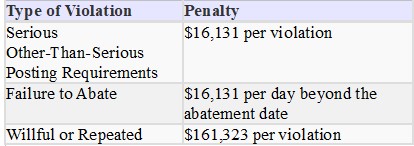
Accident Prevention & Investigation
Accident Prevention Plan
Workplace accident prevention plans and control of hazards is the result of a well designed and executed safety and health program. One of the keys to a successful program includes unbiased, prompt and accurate workplace accident investigations. The basic purpose of these investigations is to determine measures that can be taken to prevent similar accidents in the future. A comprehensive occupational Illness and Injury prevention plan can save money and lives.
Accident Investigation Techniques
An accident is any unplanned event that results in personal injury or in property damage. When the personal injury requires little or no treatment, it is minor. If it results in a fatality or in a permanent total, permanent partial, or temporary total (lost-time) disability, it is serious. Similarly, property damage may be minor or serious. Investigate all accidents regardless of the extent of injury or damage.
Workplace Accident Prevention
Accidents are usually complex. An accident may have 10 or more events that can be causes. A detailed analysis of an accident will normally reveal three cause levels: basic, indirect, and direct. At the lowest level, an accident results only when a person or object receives an amount of energy or hazardous material that cannot be absorbed safely. This energy or hazardous material is the DIRECT CAUSE of the accident. The direct cause is usually the result of one or more unsafe acts or unsafe conditions, or both. Unsafe acts and conditions are the INDIRECT CAUSES or symptoms. In turn, indirect causes are usually traceable to poor management policies and decisions, or to personal or environmental factors. These are the BASIC CAUSES.
In spite of their complexity, most accidents are preventable by eliminating one or more causes. Accident investigations determine not only what happened, but also how and why. The information gained from these investigations can prevent recurrence of similar or perhaps more disastrous accidents. Accident investigators are interested in each event as well as in the sequence of events that led to an accident. The accident type is also important to the investigator. The recurrence of accidents of a particular type or those with common causes shows areas needing special accident prevention emphasis.
Most accidents are preventable by eliminating one or more causes. Accident investigations determine not only what happened, but also how and why. The information gained from these investigations can prevent recurrence of similar or perhaps more disastrous accidents. Accident investigators are interested in each event as well as in the sequence of events that led to an accident. The accident type is also important to the investigator. The recurrence of accidents of a particular type or those with common causes shows areas needing special accident prevention emphasis.
Accident Investigation
In general, experienced personnel should conduct interviews. All interviews should be conducted in a quite and private location. It is essential to get preliminary statements as soon as possible from all witnesses. Investigators should not provide any facts to the witness - only ask non-leading questions.
Accidents represent problems that must be solved through investigations. Formal procedures are helpful in identifying and solving problems. This section discusses two of the most common procedures: Change Analysis and Job Safety Analysis.
Accident Fact Finding
Gather evidence from many sources during an investigation. Get information from witnesses and reports as well as by observation. Interview witnesses as soon as possible after an accident. Inspect the accident site before any changes occur. Take photographs and make sketches of the accident scene. Record all pertinent data on maps. Get copies of all reports. Documents containing normal operating procedures, flow diagrams, maintenance charts, or reports of difficulties or abnormalities are particularly useful. Keep complete and accurate notes in a bound notebook. Record pre-accident conditions, the accident sequence, and post-accident conditions. In addition, document the location of victims, witnesses, machinery, energy sources, and hazardous materials.
In some investigations, a particular physical or chemical law, principle, or property may explain a sequence of events. Include laws in the notes taken during the investigation or in the later analysis of data. In addition, gather data during the investigation that may lend itself to analysis by these laws, principles, or properties. An appendix in the final report can include an extended discussion.
After interviewing all witnesses, the team should analyze each witness' statement. They may wish to re-interview one or more witnesses to confirm or clarify key points. While there may be inconsistencies in witnesses' statements, investigators should assemble the available testimony into a logical order. Analyze this information along with data from the accident site.
Not all people react in the same manner to a particular stimulus. For example, a witness within close proximity to the accident may have an entirely different story from one who saw it at a distance. Some witnesses may also change their stories after they have discussed it with others. The reason for the change may be additional clues.
A witness who has had a traumatic experience may not be able to recall the details of the accident. A witness who has a vested interest in the results of the investigation may offer biased testimony. Finally, eyesight, hearing, reaction time, and the general condition of each witness may affect his or her powers of observation. A witness may omit entire sequences because of a failure to observe them or because their importance was not realized.
All materials in the members area for this topic index
Safety Videos for Download
Ladder Safety
Substance Abuse
Lockout - Tagout
Office Safety
Forklift Carbon Monoxide Hazard
Hearing Conservation
Ergonomics
Back Safety
Drowsy Driving
Confined Space Death
Driving & Medication
Emergency Planning
Fall Prevention
Forklifts & Pedestrians
Electrical Arc Flash Hazards
Trenching Basics

GET INSTANT ACCESS
to THE MEMBERS LIBRARY
Safety materials created by safety professionals.
Access to the Safety Manager software.
Wide variety of safety videos and courses.
**Brand New** Safety Training Management System
Pre-Made Safety Materials Ready For Use
Created by experienced safety professionals & risk consultants. Saving you time, money, and risk of injuries.
95% of the work already done.
Below are the maximum penalty amounts, with the annual adjustment for inflation, that may be assessed after Jan. 15, 2024. (See OSHA Memo, Jan. 8, 2024).

**New OSHA HEAT 90 DAY**
>>Download Free HERE<<
**New 2024 OSHA 300 Form**
>>Download Free HERE<<
**Brand New**
Free with full membership subscription
Training LMS System
Ask The Safety Consultant
Safety Equipment Deal Finder

“SafetyInfo.com is the first go-to website for safety professionals and companies to use in establishing a solid safety program"
-Mike McKenzie, Certified Safety & Health Manager (CSHM), McSafety Solutions™
Note: You must have a full subscription to the Safety Library in order to use this material. Any use outside of your organization, for resell, or without an active membership is strictly prohibited and may result in prosecution under copyright infringement laws. Please contact us first, if you would be interested in reselling or using our materials for reproduction.
Inside the Members Library
Topic Index
Accident Prevention
Air Quality
Asbestos
Bloodborne Pathogens
Boilers
Chemical Safety
Compressed Gas
Confined Space
Construction
Construction Worksite
Cranes & Slings
Driver / Fleet Safety
Drug Free Workplace
Electrical
Emergency Management
Engineering Safety
Environmental
Equipment
Ergonomics
Fall Protection
Fire Safety & Prevention
First Aid
Flammable Materials
Forklifts
Hazard Communication
Hazardous Materials
Hearing Protection
Heat Stress
Hot Work
Housekeeping
Job Safety Analysis
Laboratory
Ladders
Lead
Lockout-Tagout
Machinery & Equipment
Material Handling
MSDS (SDS)
Medical & First Aid
Occupational Health
Office Safety
Off the Job Safety
Personal Protection
Process Safety
Record Keeping
Respiratory Protection
Silica Safety
Rules & Policies
Signs & Labels
Slips, Trips & Fall
Training
Terrorism Programs
Tool Safety
Vehicle & Driver
Violence Programs
Welding & Hot Work
Training Videos
Library Index
Training Materials
Videos/Courses
Talks
Articles
PowerPoint
Handouts
Training Overheads
Quizzes
Supervisor Briefs
Management Briefs
Safety Sessions
2 Minute OSHA Safety Talks
Pamphlets
First Aid Training
Supervisor Training
Hazardous Materials
Bomb Threat
Crossword Puzzles
Biological Agents
Forms & Documents
Forms
Checklists
Audit Guides
Inspections Guides
Signs & Labels
Environmental Audit Guides
Recordkeeping - OSHA 300
Sign & Label Maker
Safety Management Resources
Safety Manuals/Written Programs
Ergonomic Programs
Emergency Plans
Process Safety Management
Construction Safety
Occupational Health
Environmental
Topic Sheets
DOT Fleet-Driver
Hazardous Materials
Chemical Safety
Drug Free Workplace
Terrorism Programs
Development Guides
Safety Manager Software
Safety References & Graphics
Technical Safety Information
Posters
Topic & Fact Sheets
Development Information
Job Specific Safety Rules
Terrorism
Calculators
Safety Comic Strips
New Safety Training System
Schedule and train your employees with our materials. Add unlimited amount of employees. Record all progress and issue certificates. For group and individual training sessions.

